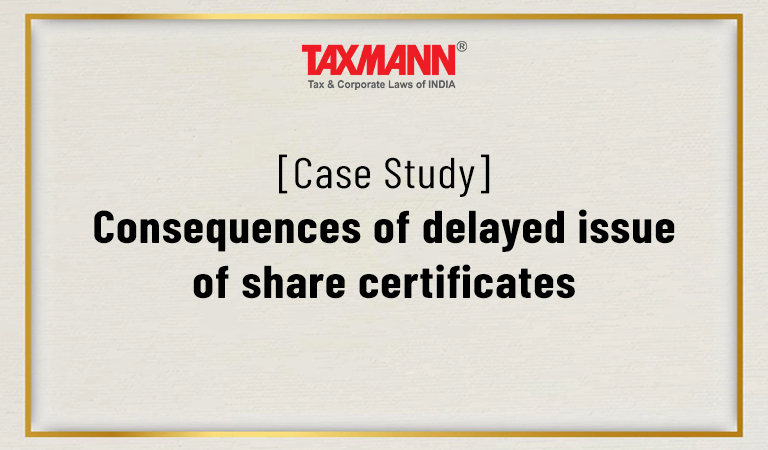[Case Study] Consequences of delayed issue of share certificates
- News|Blog|Company Law|
- 2 Min Read
- By Taxmann
- |
- Last Updated on 7 December, 2022

[2022] 145 taxmann.com 287 (Article)
1. Post-incorporation compliance in a company
The subscribers to the Memorandum of Association of a company are considered as the first shareholders of the company when the company is incorporated. One of the post-compliances required by the company is to issue the share certificate to the subscribers of the Memorandum within two months from the date of incorporation.
The company should receive the share subscription money from the subscribers and thereafter the company is required to issue the share certificates i.e. the share certificates can only be issued after the receipt of money. Upon receipt of the subscription money, the company is mandatorily, required to issue the share certificates within a period of two months’ time from the incorporation of the company. Later on whenever, further shares are allotted to the existing or new shareholders, the share certificates is required to be issued within two months from the date of allotment.
With respect to the above compliance requirement, the Companies Act 2013, spells out the provisions in its section 56 of the Companies Act, 2013.
2. Relevant provisions under the Companies Act 2013
Sub-section (4) (a) of section 56 of the Companies Act 2013 provides inter alia that every company shall, unless prohibited by any provision of law or any order of Court, Tribunal or other authority, deliver the certificate of all securities allotted, transferred or transmitted within a period of two month from the date of incorporation, in the case of subscriptions to the memorandum.
3. Penal provision for any default/violation under the Companies Act 2013
Sub-section (6) of section 56 of the Companies Act 2013, provides inter alia that where any default is made in complying with the provisions of sub sections (1) to (5), the company and every officer of the company who is in default shall be liable to a penalty of fifty thousand rupees.
4. Consequences of default/violation – action from the Regulator
To understand the consequences of any default while in complying with the provisions of section 56 of the Companies Act 2013, relating to timely delivery of the certificate of securities allotted, transferred or transmitted, let us go through the decided case law by the Registrar of Companies, Mumbai on this matter on 21st October 2022.
5. The relevant case law on this matter
We shall go through the adjudication order passed by the Registrar of Companies of Mumbai on 21st October 2022 in the matter of M/s IMC India Securities Private Limited, Mumbai city, order bearing no. No. ROC (M)/NJN/ADJ-ORDER/49361/2096-2099/RD-03 for penalty under Section 454(3) of the Companies Act, 2013 Read with rule 3 of companies (Adjudication of Penalties) Rules 2014 in the matter of non-compliance of the Provisions of sub-section (4) of section 56 of the companies, 2013.
Click Here To Read The Full Article
Disclaimer: The content/information published on the website is only for general information of the user and shall not be construed as legal advice. While the Taxmann has exercised reasonable efforts to ensure the veracity of information/content published, Taxmann shall be under no liability in any manner whatsoever for incorrect information, if any.

Taxmann Publications has a dedicated in-house Research & Editorial Team. This team consists of a team of Chartered Accountants, Company Secretaries, and Lawyers. This team works under the guidance and supervision of editor-in-chief Mr Rakesh Bhargava.
The Research and Editorial Team is responsible for developing reliable and accurate content for the readers. The team follows the six-sigma approach to achieve the benchmark of zero error in its publications and research platforms. The team ensures that the following publication guidelines are thoroughly followed while developing the content:
- The statutory material is obtained only from the authorized and reliable sources
- All the latest developments in the judicial and legislative fields are covered
- Prepare the analytical write-ups on current, controversial, and important issues to help the readers to understand the concept and its implications
- Every content published by Taxmann is complete, accurate and lucid
- All evidence-based statements are supported with proper reference to Section, Circular No., Notification No. or citations
- The golden rules of grammar, style and consistency are thoroughly followed
- Font and size that’s easy to read and remain consistent across all imprint and digital publications are applied



 CA | CS | CMA
CA | CS | CMA
